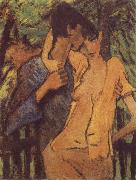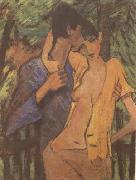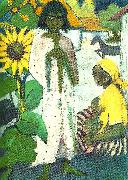All Otto Mueller's oil paintings


|
|
|
| ID |
Image |
Oil Pantings, Sorted from A to Z |
Other Information |
| 97716 |
 |
Betende Frauen beim Vaterunser |
1882(1882)
Medium oil on canvas
Dimensions 64 x 86 cm
cyf |
| 34069 |
 |
Lovers |
mk87
1919
Distemper on burlap
106x80cm
Ravensburg |
| 21671 |
 |
Lovers (mk09) |
1919
Distemper on burlap 106 x 80 cm
Ravensburg,Private collection |
| 91891 |
 |
Three Girls in a Wood |
1913 or c. 1920
Medium English: Oil and tempera on panel
Dimensions 48 x 53 1/16 in. (121.9 x 134.8 cm)
cjr |
| 67525 |
 |
zigenare med solrosor |
1927
se |
|
|
| Otto Mueller
|
| German Painter, 1874-1930
Otto Mueller was born on October 16, 1874, in Liebau, German Silesia. His mother had been adopted as a young girl, giving rise to the story that he was the son of a gypsy - a story he never denied. He was a cousin to the famous German writers and dramatists Gerhart and Carl Hauptmann (the latter's novel "Einhart der Lächler" is an imaginary portrait of the painter). After four years of apprenticeship with a lithographer, Mueller entered the Academy of Fine Arts in Dresden in 1894. He was dissatisfied with the conservative instructions and left after two years. The next several years he lived close to his influential cousins, and for a short while he went to Munich to study with the famous painter Franz von Stuck. Information about his life and work until 1908 - when he settled in Berlin - is sketchy, especially since the artist destroyed many of his earlier works. In Berlin Mueller met the expressionist sculptor Wilhelm Lehmbruck, whose concept of the human form had a decisive influence on his own perception. When in 1910 his entries to the exhibition of the Berlin Secession were rejected he joined the members of the artist group "Die Brecke" (The Bridge) and exhibited with the New Secession and thus met Ernst Ludwig Kirchner, Ernst Heckel, and Karl Schmidt-Rottluff. He became their lifelong friend, and, while only slightly influenced by their woodcut techniques, he contributed in return his experience in lithography and especially his techniques of distemper painting (colors bound by glue or size). This technique permits the quick coverage of large areas of the very rough canvas (burlap) which he preferred and adds a subdued luminosity. Since overpainting in distemper is not possible, the artist has to have a clear conception of his work before he begins. The technical devices strengthened the Brecke painters' desire to "flatten" the image on the canvas - following the examples of Paul Gauguin and even Edvard Munch and rejecting the academic preference for an emphasis on three-dimensionality of the subject. In his graphic works Mueller experimented with mixtures of woodcut and lithography, the rubbing of the printer's ink, frequently adding color in the form of watercolor or colored chalk, until he had the technical means of the Breslau Academy available to make true color lithographs. His "Gypsy-Portfolio" (nine color lithographs in a portfolio of 1927), which used as many as five stones, is one of his great achievements as a graphic artist. From 1916 to 1918 he served as a soldier in World War I, an experience which left no impact on his work. Shortly after his return he was appointed professor at the Breslau Academy of Art, where he taught until his death. Mueller's work shows only three motifs: landscapes, gypsies, and primarily nudes in landscapes. The last motif dominated his work. The earthen color of his mostly young, subtle but angular nude girls forms with the subdued and delicate greens of the landscape backgrounds a vision of a lost past. There is a frequently melancholic nostalgia in his works, presenting a harmony between nature and the human form which is not only opposite to the academic approach but also to that of the other Expressionists.
. Related Artists to : | aksel jorgensen | Hercules Seghers | Emil Barentzen | Ralph Earl | Miles Evergood | |

|
|

|
|